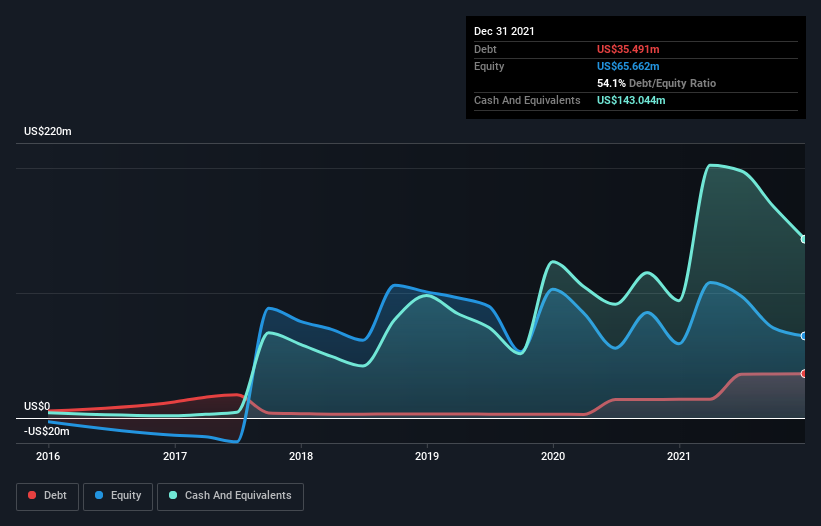- United States
- /
- Biotech
- /
- OTCPK:MTEM.Q
Rock star Growth Puts Molecular Templates (NASDAQ:MTEM) In A Position To Use Debt
David Iben put it well when he said, 'Volatility is not a risk we care about. What we care about is avoiding the permanent loss of capital.' When we think about how risky a company is, we always like to look at its use of debt, since debt overload can lead to ruin. As with many other companies Molecular Templates, Inc. (NASDAQ:MTEM) makes use of debt. But the real question is whether this debt is making the company risky.
When Is Debt A Problem?
Debt and other liabilities become risky for a business when it cannot easily fulfill those obligations, either with free cash flow or by raising capital at an attractive price. Ultimately, if the company can't fulfill its legal obligations to repay debt, shareholders could walk away with nothing. However, a more common (but still painful) scenario is that it has to raise new equity capital at a low price, thus permanently diluting shareholders. Having said that, the most common situation is where a company manages its debt reasonably well - and to its own advantage. The first thing to do when considering how much debt a business uses is to look at its cash and debt together.
See our latest analysis for Molecular Templates
How Much Debt Does Molecular Templates Carry?
As you can see below, at the end of December 2021, Molecular Templates had US$35.5m of debt, up from US$14.9m a year ago. Click the image for more detail. But it also has US$143.0m in cash to offset that, meaning it has US$107.6m net cash.

A Look At Molecular Templates' Liabilities
We can see from the most recent balance sheet that Molecular Templates had liabilities of US$46.7m falling due within a year, and liabilities of US$80.0m due beyond that. Offsetting this, it had US$143.0m in cash and US$234.0k in receivables that were due within 12 months. So it actually has US$16.6m more liquid assets than total liabilities.
This surplus suggests that Molecular Templates is using debt in a way that is appears to be both safe and conservative. Because it has plenty of assets, it is unlikely to have trouble with its lenders. Simply put, the fact that Molecular Templates has more cash than debt is arguably a good indication that it can manage its debt safely. The balance sheet is clearly the area to focus on when you are analysing debt. But it is future earnings, more than anything, that will determine Molecular Templates's ability to maintain a healthy balance sheet going forward. So if you're focused on the future you can check out this free report showing analyst profit forecasts.
In the last year Molecular Templates wasn't profitable at an EBIT level, but managed to grow its revenue by 105%, to US$39m. So there's no doubt that shareholders are cheering for growth
So How Risky Is Molecular Templates?
Statistically speaking companies that lose money are riskier than those that make money. And in the last year Molecular Templates had an earnings before interest and tax (EBIT) loss, truth be told. Indeed, in that time it burnt through US$34m of cash and made a loss of US$83m. However, it has net cash of US$107.6m, so it has a bit of time before it will need more capital. Importantly, Molecular Templates's revenue growth is hot to trot. While unprofitable companies can be risky, they can also grow hard and fast in those pre-profit years. There's no doubt that we learn most about debt from the balance sheet. But ultimately, every company can contain risks that exist outside of the balance sheet. Be aware that Molecular Templates is showing 2 warning signs in our investment analysis , you should know about...
At the end of the day, it's often better to focus on companies that are free from net debt. You can access our special list of such companies (all with a track record of profit growth). It's free.
New: Manage All Your Stock Portfolios in One Place
We've created the ultimate portfolio companion for stock investors, and it's free.
• Connect an unlimited number of Portfolios and see your total in one currency
• Be alerted to new Warning Signs or Risks via email or mobile
• Track the Fair Value of your stocks
Have feedback on this article? Concerned about the content? Get in touch with us directly. Alternatively, email editorial-team (at) simplywallst.com.
This article by Simply Wall St is general in nature. We provide commentary based on historical data and analyst forecasts only using an unbiased methodology and our articles are not intended to be financial advice. It does not constitute a recommendation to buy or sell any stock, and does not take account of your objectives, or your financial situation. We aim to bring you long-term focused analysis driven by fundamental data. Note that our analysis may not factor in the latest price-sensitive company announcements or qualitative material. Simply Wall St has no position in any stocks mentioned.
About OTCPK:MTEM.Q
Molecular Templates
A clinical stage biopharmaceutical company, focuses on the discovery and development of biologic therapeutics for the treatment of cancer and other serious diseases in the United States.
Adequate balance sheet low.
Market Insights
Community Narratives



